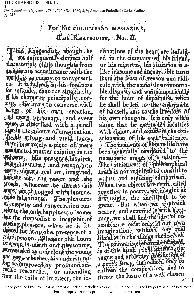 ―537― ―537―
For the columbian magazine.
The Rhapsodist, No. II.
THE Rhapsodist, though he
not unfrequently derives half
the materials of his thoughts from
an intimate acquaintance with the
world, is an enemy to conversati-
on. It is indeed, in his fondness
for solitude, that the singularity
of his character principally con-
sists. He loves to converse with
beings of his own creation,
and every personage, and every
scene, is described with a pencil
dipt in the colours of imagination.
To his strong and vivid fancy,
there is scarcely a piece of mere
unanimated matter existing in the
universe. His presence inspires,
being, instinct, and reason into
every object, real or imagined,
and the air, the water and the
woods, wherever he directs his
steps, are thronged with innume-
rable inhabitants. The pleasures
of company and conversation con-
stitute the only happiness of some;
but the rhapsodist is incapable of
tasting pleasure, when he is in-
debted for it to the presence of a
third person. Whether the hours
be spent in mirth and pleasantry,
surrounded by a circle of the young
and gay, whether his understand-
ing he improved by profound sci-
entific researches, or unbending
from the toils of intellect, the in-
clinations of the heart are indulg-
ed in the company of his friend,
or his mistress, his situation is a-
like irksome and uneasy. He turns
from the feast of reason and ridi-
cule with the same unsurmounta-
ble disgust, and waits impatiently
for the hour of departure, when
he shall be left to the enjoyment
of himself, and to the freedom of
his own thoughts. It is only when
alone that he exerts his faculties
with vigour, and exults in the con-
sciousness of his own existence.
The incidents of human life have
been generally compared to the
phantastic stages of a vision.—
The strictness of philosophical
truth is not required to constitute
a just and striking comparison.
When two objects are represented
together in poetry, we imagine at
first sight, the similitude to be
great. But when we approach
nearer, and examine it with accu-
racy, we shall find the idea of re-
semblance exist only in our own
imagination, without any real
likeness in the things themselves.
The comparison above mentioned,
is of this kind. It is in truth, the
vague and arbitrary production of
a poet's fancy, introduced only to
enliven the composition, and to
throw the lustre of a well chosen
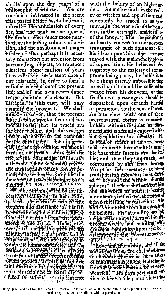 ―538― ―538―
simile upon the dry pages of a
philosophic discourse. We are
too much interested in the scene
that passes before us, to believe it
unreal. The conclusion of every
act, and the final catastrophe of
the drama, affect much more near-
ly than the fading colours of a vi-
sion, and the unsubstantial images
of sleep. But perhaps it is neces-
sary to abstract our attention from
surrounding objects, to transport
ourselves some million of years
forward from the present date of
our existance, in order to form a
rational conception of the present
life, and of our own resemblance
to the phantom of a dream. But
distance, in this case, will only
magnify the prospect. We shall
quickly discover, that the present
state is built upon a firm and im-
mortal basis; that its traces are
for ever visible, and its vestiges
preserved entire to the remotest
period of futurity. Such in gene-
ral, is the true opinion we should
form of our present state. But the
life of the rhapsodist is literally
a dream. If he wishes to review
the transactions of any former pe-
riod, he searches in vain for the
memory of it—it is nought but a
shadow.
Was he not compelled by the ne-
cessities belonging to his nature,
to seek at certain seasons, the
comfort and assistance of his fel-
low creatures, he would withdraw
himself entirely from the com-
merce of the world. He is, how-
ever, still enabled to preserve his
dignity sacred from promiscuous
Intercourse. He industriously a-
voids the humerous circle, and the
frequent converse, and is always
to be found in the deepest recesses
of his garden, or retired to muse
and meditate in his chamber. In
this situation he is naturally in-
duced to solicit an acquaintance
with the beings of an higher or-
der. An entire faith in the reali-
ty of witches and apparitions may
commonly be traced to its true
source, in the warmth of the passi-
ons, in the strength and fertility
of the fancy. The rhapsodist is
an hearty convert to the most ex-
travagant of such opinions: but
his ideas upon this subject are not
tinged with the melancholy gloom
of superstition. He believes it de-
rogatory to the majesty of the su-
preme being; nay, he holds it to
be a thing utterly impossible that
an evil spirit should be suffered to
escape from his dungeon, or that
God's own messengers should be
dispatched upon errands hurtful
or pernicious to the sons of men.
An interview with one of those
preternatural forms is conceived
in idea without disquiet or unea-
siness, and is actually enjoyed with-
out trepidation or dismay. He
is void of terror at this tremend-
ous moment, because he is sensi-
ble that their intents are charita-
ble, and that they approach, ac-
companied by airs from heaven.
Wrapt in silent exstacy at some
transporting moment, he is carri-
ed “beyond the visible diurnal
sphere:” the barrier between him
and the world of spirits, has for
a moment yielded to the force of
heart-thrilling meditation: the
film is removed from his eyes, and
he beholds his attending genius,
or guardian angel, arrayed in am-
brosial weeds, and smiling with
gracious benignity upon the bold
attempts of the adventurous pu-
pil.
Love and friendship, and all the
social passions, are excluded from
his bosom. Nature is the mistress
of his affections, in the contempla-
tion of whose charms he is never
wearied. He pays perpetual ser-
vice at her shrine; and views her
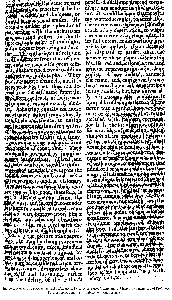 ―539― ―539―
countenance with the same regard
and admiration, whether it be in-
volved in clouds and darkness, or
dressed in gaiety and smiles. He
meditates amidst the splendor of
the morning with the enthusiasm
of a poet; and reflects in the si-
lence and solemnity of midnight,
with a rapture borderiug on devo-
tion. The enthusiasm of religion
is little different from that of poe-
try, and these are with great diffi-
culty distinguished from a sublime
and rational philosophy. They
flow in separate channels, but it is
most probable that they are de-
rived from the self same fountain.
The effects, at least, of their seve-
ral propensities, are exactly simi-
lar. Abhorring equally the noise
and clamour of the forum, they fly
to solitude and silence, to musing
and to contemplation, frequenters
of the shade, and accustomed to
indulge the airy flights of a fancy,
vigorous from use and bold from
the absence of constraint. They
are equally governed by imagina-
ginary inspirations. Tired and
disgusted with the world's unifor-
mity, they turn their eyes from the
insipid scene without, and seek a
gayer prospect, and a visionary
happiness in a world of their own
creation. The poet, therefore, is
not a distinct person from the
rhapsodist, and in order to render
his picture consistent and com-
plete, I must bestow upon him a
sublime and elevated devotion,
and raise him to a level with the
most illustrious of philosophers.
Such is the picture of a rhapso-
dist. It may be thought a mere
exaggerated copy, taken injudici-
ously from some true original, by
a young and inexperienced artist:
or it may be considered as an art-
ful contrivance, designed to shew
the skill and ingenuity, rather
than the fidelity, of the author's
pencil. I shall not pretend to vin-
dicate my conduct in this particu-
lar. It would be inconsistent with
my wonted scruples, to affirm that
there ever was a person within the
reach of my observation, to whom
the character of a rhapsodist, in
its full extent, could with any pro-
priety be applied. I am least of
all disposed to assert, that the
writer of these papers displays in
his life and and actions, a true and
genuine representation of a rhap-
sodist. I have indeed, assumed
the name, and consequently may
have raised unusual expectations
in my readers; but how universal-
ly is it known, that ambition is
incapable of being satiated. There
never was a genius, however emi-
nent or distinguished, that rested
satisfied with its own exertions,
for it is the lot of genius only to
form an idea of perfection, which,
though all its ambition be direct-
ed to that single object, it shall
never be able to realize. Thus it
was that Cicero conceived a cha-
racter of perfect eloquence, adorn-
ed with every accomplishment that
mind or body is capable of posses-
sing. He described an impossible
assemblage of virtues, and surveyed
with fondness a picture, to which
there was no original or resem-
blance among mortals. It is a
circumstance remarkable in the
conduct of poets also, that nothing
below the point of unattainable
excellence, has ever satisfied their
exorbitant ambition. I, though
the lowest of the laureate frater-
nity, presume to rival, my seniors
in the extent and grandeur of my
hopes. The character of a Rhap-
sodist, as delineated above, is
what I conceive to be the just cri-
terion of excellence, and the only
model which those who are emu-
lous of his happiness, may with
safety imitate.
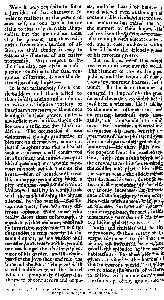 ―540― ―540―
Were it only requisite to form
a just idea of that character, in
order to realize it in the person of
ones self, no one has a better
claim to that title than this Rhap-
sodist, but the inclination must
also be present, together with
such a favourable situation of af-
fairs, as shall render it easy to
follow the dictates of his native
propensity. With respect to in-
clination also, my claim is indis-
putable: but it is to the fatal ven-
geance of fortune, I owe the de-
struction of my hopes.—
It is the melancholy fate of cas-
tle builders, and those allied to
them in disposition and in talents,
to raise an infinite variety of
imaginary structures, without once
having it in their power, materi-
als sufficient to build a single edi-
fice upon a solid and durable foun-
dation. The occupation of those
visionaries, though productive of
pleasure to themselves, is an ob-
ject of laughter and ridicule with
such as possess souls contracted
into instinct, and minds suscepta-
ble of passions, not a whit supe-
rior to those which actuate the
brute.—Men of sense will treat
this unhappy propensity with a
pity mingled with admiration.
Unhappy I call it, in compliance
with the mode of using the phrase
adopted by the world.—But for
my own part, I am of a very dif-
ferent opinion from those who
really deem them unfortunate. I
speak it with confidence, inspired
by invariable experience. That the
rhapsodist (a term nearly of the
same import, as my reader will
perceive, with castle builder) would
not exchange the solitary plea-
sures of his garden, and his cham-
ber for the joys that encircle the
imperial diadem. He gazes with
a cold indifference at the laurel
which is pompously displayed as
the need of conquerors and of po-
ets, and the lustre of his eyes is
not deadened even at the sight of
contemptible rivals, whose prosper-
ous ambition has raised them to
the summit of their hopes. He
retires from the glorious ceremony
of a triumph with a heart content-
ed, and at ease, and seeks with a
cheerful haste the friendly gloom
of his favorite grotto.——
But perhaps, even this sacred
recess cannot shut out the world.
The clamour of the exulting po-
pulace, and the shouts of tumul-
tuous joy, murmur hoarsely in the
wind. But he is at this moment
engaged in improving the gran-
deur of the scene, to which he has
just been a witness. He is adding
to the number of spectators and
encreasing hundreds into thou-
sands, and thousands into milli-
ons. He contrives a chariot and
a train for his hero, worthy the
greatness of his exploits, and gives
him the dignity and grace of an
immortal.—He then pulls down
the pageant from his exalted sta-
tion, strips him of the purple and
the crown, turns him loose among
the rabble, and places himself in
the vacant seat; the sudden shout
that invaded his ears, does not in-
terrupt the œconomy of the visi-
on, it only increases the import-
ance of the imaginary conqueror.
He swells with unusual transport,
at this new instance of his coun-
trymens applause, for such, in this
momentary paroxism of his fren-
zy, he imagines it to be.—
Vain and fruitless will be thy
endeavours, O thou votary of the
wayward muse! to disclose the
beauty of inchanted scenes, and
reveal the splendor of her secret
habitation. To thee alone is it
given to visit “the bottom of
this monstrous world,” to glide
secure along the waste of waters,
to follow with momentary speed
the footsteps of thy guide, and to
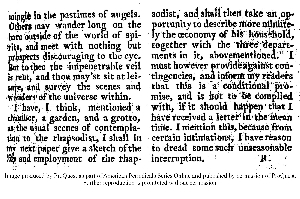 ―541― ―541―
mingle in the pastimes of angels.
Others may wander long on the
bare outside of the world of spi-
rits, and meet with nothing but
prospects discouraging to the eye.
But to thee the impenetrable veil
is rent, and thou may'st sit at lei-
sure, and survey the scenes and
wonders of the universe within.
I have, I think, mentioned a
chamber, a garden, and a grotto,
as the usual scenes of contempla-
tion to the rhapsodist, I shall in
my next paper give a sketch of the
life and employment of the rhap-
sodist, and shall then take an op-
portunity to describe more minute-
ly the œconomy of his household
together with the three depart-
ments in it, abovementioned. I
must however provide against con-
tingencies, and inform my readers
that this is a conditional pro-
mise, and is not to be complied
with, if it should happen that I
have received a letter in the mean
time. I mention this, because from
certain intimations, I have reason
to dread some such unseasonable
interruption.
R.
|